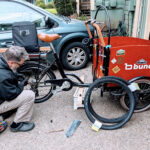Front fork failures on bicycles pose a significant safety hazard, and certain suspension systems, like those found in “Ground Assault” front forks, warrant careful attention. This analysis stems from observations made during a lawsuit involving a “Positrack 7000” suspension front fork, originally equipped on a Pacific Nomad all-terrain bicycle. Preliminary examinations suggest that “Ground Assault” forks, commonly used on 26″ wheel All-Terrain Bicycles (ATBs) and 20″ wheel children’s bicycles, may share similar construction characteristics with the failed Positrack 7000 model. It’s important to note that while labeled similarly, not all forks may adhere to the exact same design. Pacific off-road bicycles are widely available, often found in retail stores like Toys R Us, and feature components typically seen on higher-end bicycles, such as lightweight aluminum rims and front suspension. Some models even include rear suspension.
Bicycle with front fork disassembled due to Positrack 7000 failure.
Fork crown breakage is a known issue leading to recalls of various models, including Pacific forks with the “Positrack 7000” label. However, the failure observed in this instance is distinct. Like many suspension front forks, the Positrack fork utilizes a telescoping assembly for each fork blade. This design incorporates “stanchions,” posts connected to the fork crown, that slide within “sliders,” tubular components attached to the front hub. The stanchion’s lower end, sealed except for a small central hole, applies pressure to elastomer “donuts” within the slider. This elastomer suspension system exhibits a “bottom-out” behavior, becoming progressively stiffer as compression increases. A “top-out” mechanism is also crucial to prevent overextension when the fork is unloaded. In the Positrack fork, a central bolt runs through the elastomer donuts, the stanchion’s central hole, another elastomer donut, and a washer. At full extension, this washer compresses against the stanchion end. Failure of this top-out assembly can result in the sliders detaching completely from the stanchions.
Past recalls of other suspension fork models have been linked to improperly tightened or secured central bolts. However, the Positrack fork issue presents a different problem: the top-out washers are constructed from a pliable plastic material, possibly ABS, which lacks the durability to withstand repeated impacts from the small-diameter bolt head during top-out events. The following images illustrate the failure of these washers.
Broken top-out washer from Positrack 7000 fork.
Bent slider of Positrack 7000 fork after failure.
While this analysis specifically addresses the Positrack 7000, the potential similarity in construction to “Ground Assault” forks raises concerns. Regular maintenance and inspection of front suspension systems are critical, especially for forks potentially using similar top-out washer designs. While specific maintenance procedures for “Ground Assault” forks need to be determined based on their exact construction, understanding the failure mechanism of similar systems like the Positrack 7000 highlights the importance of careful inspection for any signs of wear or deformation in the fork components. If you own a bicycle with “Ground Assault” front suspension, particularly older models or those purchased from general retail outlets, it is advisable to consult with a qualified bicycle mechanic to assess the fork’s condition and ensure safe operation. Further investigation and potentially proactive component replacement might be necessary to mitigate the risk of failure.

